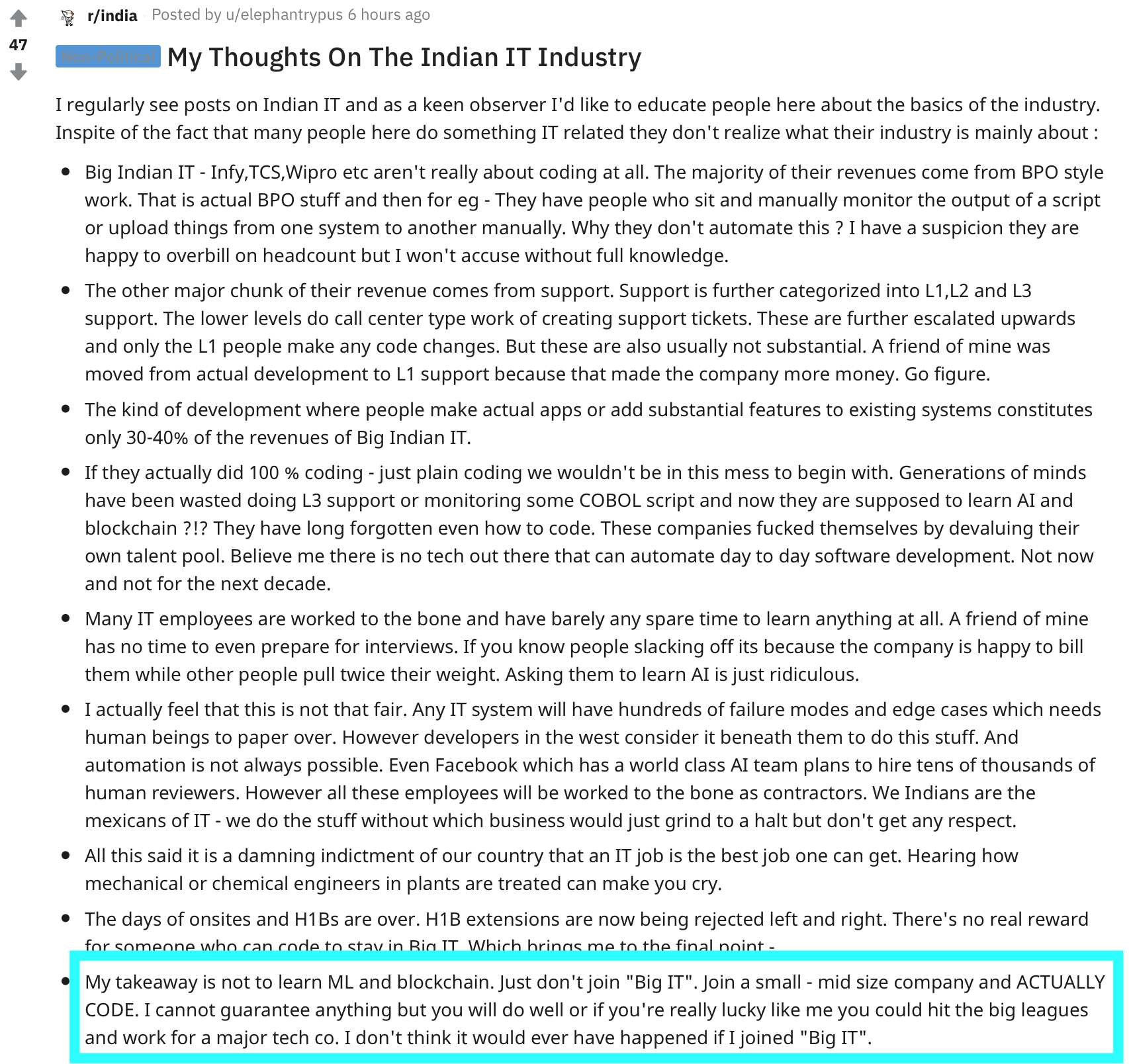The new new Koh-i-Noors
A few months ago, I wrote about the new Koh-i-Noors of India. These Koh-i-Noors were, to me, the fruit of the work done by stalwarts of the Indian IT industry who were able to walk into corporate boardrooms of heavily industrialized countries and convince them to take a punt on barely English speaking technology backwater like India of the 1980s and 1990s.
I think it is time for a quick update on that thesis.
TCS is now a $100 Billion dollar company
The marketcap of TCS, a perennial favorite bugbear of American nativists, recently breached the emotional threshold of $100 Billion in marketcap. Keep in mind that TCS is listed on the NSE which means its marketcap was achieved in rupee denominated terms with a much shallower, less sophisticated investor base than, say, American capital markets. Who can say what its valuation would have been in more mature markets? For example, IBM has a market cap of $133 Billion and Accenture is right behind TCS at $97 Billion.
And Yet, the Kvetching Continues
Proof from yesterday, May 1st, 2018
You can also read this missive in the below screenshot.

The coup de grace of the piece, the part where the author cannot resist a bit of self stimulation is this morsel of ME-ME-ME
I cannot guarantee anything but you will do well or if you're really lucky like me you could hit the big leagues and work for a major tech co.
This is prima facie stupid on so many levels.
- Creating a service or company which customers pay for is a rite of passage that is deserving of respect, not sniping and backbiting. Literally every company in the world is a service company where the work most employees do is often tedious, uninspiring, insipid, repetitive, and not worth discussing at a dinner party. Yes, maybe the people they work with or the facilities they enjoy or the brand name catchet the company enjoys are significantly better than any old Indian IT shop but let's not pretend that a shiny Mac Book, bean bag lounges, and a gourmet cafeteria magically makes your work ultra mission critical. Heck, I'm pretty sure a lot of us would sneer if a fictitious company called AdsToRipOffYourGrandma invited us for an interview but change AdsToRipOffYourGrandma to Google and watch us "big leaguers" jizz ourselves in anticipation.
- Every company in the world is set up to extract rent. That is how capitalism works. And for now, this is how society progresses. The creative tension in capitalism lies in the space between paying rent to someone else to do something for you and paying an opportunity cost to build a better solution for yourself and then extracting rent on that solution. We are blinding ourselves to this when we start dumping on outsourcing companies because only "30-40%" of the work adds to the bottom line or because they are trying to "overbill" the client. If you question this business model, you are questioning capitalism which is a politcal and epistemological discussion, not a reason to shit on Indian outsourcing companies.
Digital Colonies
Then came this opinion piece about how Flipkart, unable to compete against Amazon has brought in Walmart and Google to help in the fight. It warns that Indian technology companies run the risk of being reduced to "Digital Colonies" of American behemoths much like Europe has become.
This led to its own round of self-flagellation like this tweet below.
If any of the Indian startups were original ideas and not ripoffs, plus functioned in a unique and honest way instead of exploiting customers, this argument would be valid https://t.co/KnIZh9iHjP
— Sharon (@sharroness) May 1, 2018
While I don't question the notion of digital colonies, was it necessary to beat ourselves up about the lack of originality shown by "any" Indian startup. Steve Jobs among others, said that "Good artists steal, great artists borrow".
My peeve with the tweet is not just about the "Everyone else is doing it too!" argument in favor of stealing and reimplementing ideas. It is also about the ignoring so many amazing startups who are doing work in core areas of human existence in India and in doing so, they are doing original work while simultaneously trying to fend off competitors.
For example, there is Saral Designs whom I interviewed for TT2C. They initially started off selling low cost sanitary napkins. Once they realized they couldn't compete against Stayfree (owned by Johnson & Johnson) and Whisper (owned by Proctor & Gamble), they pivoted to selling the machines used to make sanitary napkins.
And then there is Chaos Theory from Nagpur who told me that they established a foothold in the capital intensive co-working business by building relationships with event organizers and providing digital marketing solutions for local talent in Nagpur. I don't think WeWork will be able to simply walk into Nagpur and take over co-working once the sticky effect of having a full events calendar is in place.
The Upsdot
What I want to say is that the Indian story is a LOT more nuanced and full of ferment than the headline noise and broad generalizations we succumb to.
Take a look at what is burbling right below the eye line. You may be surprised at what you see. Pleasantly surprised.